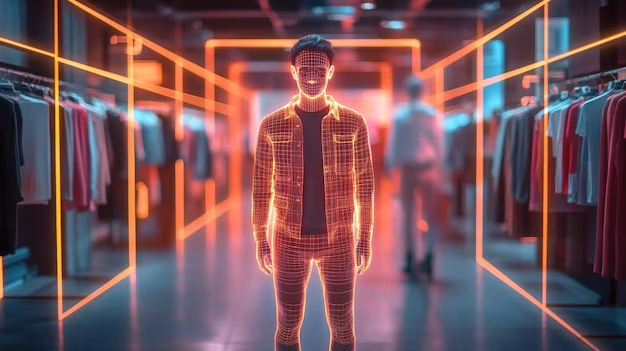The fashion industry is undergoing a major transformation, thanks to artificial intelligence (AI). Online shopping has become more advanced, with AI-powered models personalizing outfit recommendations, predicting trends, and improving the overall shopping experience. In this article, we explore how AI model for outfit e-commerce and reshaping the way consumers shop for fashion.
The Role of AI in Fashion E-Commerce
AI models are being integrated into online fashion stores to streamline processes and improve customer satisfaction. These models analyze vast amounts of data, including customer preferences, purchase history, and fashion trends, to provide personalized outfit recommendations.
Key benefits of AI model in outfit e-commerce include:
- Personalized Shopping Experiences: AI suggests outfits based on individual tastes and previous purchases.
- Improved Trend Forecasting: AI predicts upcoming fashion trends using real-time data analysis.
- Enhanced Virtual Try-Ons: Customers can visualize how outfits will look using AI-generated models.
- Better Inventory Management: AI helps retailers optimize stock levels based on demand predictions.
- Reduced Returns: Personalized recommendations and virtual try-ons lead to fewer incorrect purchases.
AI Models Powering Outfit Recommendations
Several AI models play a crucial role in improving outfit selection and shopping experiences. These models use deep learning, computer vision, and natural language processing (NLP) to enhance e-commerce capabilities.
1. Computer Vision for Outfit Recognition
Computer vision allows AI to analyze images and recognize different clothing styles. It enables:
- Automated tagging: AI can identify clothing items and categorize them accurately.
- Outfit matching: Suggests complementary items to complete a look.
- Virtual try-on: AI overlays outfits onto user-uploaded images to provide a realistic preview.
2. Deep Learning for Personalized Recommendations
Deep learning models analyze vast datasets to understand customer preferences. These models:
- Predict what customers may like based on past purchases and browsing history.
- Suggest personalized outfit combinations tailored to individual styles.
- Improve accuracy over time by learning from user interactions and feedback.
3. Natural Language Processing (NLP) for Fashion Insights
NLP enables AI to process and interpret fashion-related content, such as:
- Customer reviews: Identifies common themes in feedback to improve recommendations.
- Fashion blogs and social media: Analyzes trending topics to forecast upcoming styles.
- Chatbots and virtual assistants: Enhances customer service by answering queries and suggesting outfits.
AI-Powered Features Enhancing E-Commerce Fashion
AI-driven tools are making fashion e-commerce more interactive and engaging. Some of the most popular features include:
1. Virtual Try-Ons
AI-powered virtual try-on technology allows shoppers to see how outfits look on them before making a purchase. Using augmented reality (AR) and AI, these tools create a digital dressing room experience, reducing uncertainty and increasing confidence in buying decisions.
2. AI-Powered Chatbots for Style Advice
AI chatbots assist customers in selecting outfits based on their preferences, body type, and occasions. These chatbots improve the shopping experience by offering:
- Instant responses to queries
- Personalized outfit recommendations
- Styling tips and fashion advice
3. Smart Search and Image Recognition
AI-powered search tools allow users to upload images of outfits they like and find similar items available in online stores. This feature helps shoppers quickly discover fashion pieces that match their desired styles.
4. AI for Sustainable Fashion Choices
AI models can suggest sustainable outfit options by analyzing materials, production processes, and ethical fashion brands. This feature encourages environmentally conscious shopping habits.
The Impact of AI on Fashion Retailers
Fashion retailers that integrate AI into their e-commerce platforms benefit in several ways:
- Increased Sales: Personalized recommendations lead to higher conversion rates.
- Better Customer Engagement: AI-powered interactions enhance user experience.
- Efficient Supply Chain Management: AI helps retailers predict demand and manage inventory effectively.
- Competitive Advantage: Brands leveraging AI stand out in a crowded fashion market.
Future of AI in Outfit E-Commerce
AI technology in fashion retail is continuously evolving. Some future advancements include:
- AI-generated fashion designs: AI will create custom clothing designs based on consumer preferences.
- More advanced virtual reality shopping: Shoppers will be able to walk through virtual stores and try on outfits in a fully immersive environment.
- Voice-activated shopping: AI-powered voice assistants will help customers find and purchase outfits using voice commands.
- Hyper-personalization: AI will refine outfit suggestions even further, considering factors like weather, events, and personal schedules.
Conclusion
AI models are revolutionizing outfit e-commerce by making shopping more personalized, efficient, and engaging. From deep learning-powered recommendations to virtual try-ons, AI is shaping the future of online fashion retail. As AI continues to evolve, fashion brands that embrace these innovations will stay ahead in the competitive e-commerce landscape. Whether you’re a shopper looking for the perfect outfit or a retailer aiming to enhance customer experience, AI is the key to the future of fashion e-commerce. You can alos read blogs like best ai model to read a contract.
